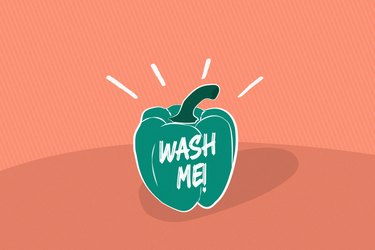
We've all found ourselves in this familiar situation: you're at a barbecue, batting away bugs from your food, when you realize one has made landfall on your sandwich. While an insect buzzing around your plate can be irritating, does it actually pose any health risks?
Here, Zachary DeVries, PhD, assistant professor of urban entomology at the University of Kentucky, explains what potential harm can come from a creepy-crawly touching down on your dish and what to do if one lands on your lunch.
Video of the Day
Video of the Day
Insects Carry a Plethora of Pathogens
"Pretty much anything you can imagine can be carried by flies and other insects," DeVries says.
However, it's not the bug itself — but where exactly it's been buzzing about — that's the issue. For instance, you've probably noticed flies frequently linger around feces. Insects like flies are attracted to unsavory things like rotting animals and plant waste, which can contain a wide range of pathogens and parasites, according to the University of Sydney.
Flies — and cockroaches, too — are the two most common species that get into our food. "Both have been found to carry things like salmonella, E. coli, cholera and typhoid fever," DeVries says.
Insects Can Transfer Pathogens to Your Food
The problem is that these pests can potentially pass on pathogens to your plate. This transfer happens through mechanical transmission, DeVries says.
Here's what that process looks like:
- When an insect encounters a pathogen (for instance, it lands on an animal carcass or a trash bin), the germs transfer to its feet or body through touch.
- Then, the insect lands on your plate and deposits the pathogen onto your food (or a food prep surface) via bodily contact.
In other words, when a fly takes a stroll on your sandwich, its footprints can leave behind a trail of bacteria and other germs.
But it gets even grosser. Flies also spread pathogens through vomit, DeVries says. Since they don't have teeth, they spew up spit with special enzymes that enable them to dissolve and eat food, according to the University of Sydney.
Making matters worse, flies are prone to pooping on your food too, DeVries says. And germs can be transmitted to your meal through both regurgitation and defecation.
What about if a bug lays eggs on your food? Since insects usually carry disease-causing microbes on their legs and feet (i.e., on the outside of the body) their "eggs are unlikely to carry pathogens," Devries says. Phew.
You Can Potentially Get Sick From Eating Contaminated Food
So, now we know that bugs can transfer bacteria, viruses and parasites to your food. But what are the chances of contracting these pathogens?
"This all depends on a variety of factors," including the following, DeVries says.
- Which types of bacteria or other possible pathogens might be in the environment (e.g., access to waste bins, sewers, etc.)
- How long the insect interacted with the pathogen sources (i.e., trash, sewage, etc.)
- How much pathogen was moved by the insect from the pathogen source to your food
- How much time the insect interacted with your food
- How long the pathogen has been "growing" on your food
- At what temperature the food was stored after pathogen exposure
Generally, the longer an insect spends in contact with a pathogen source and your food, the higher the odds that it'll contaminate your meal with germs (and the greater your risk for potential health issues), according to the University of Sydney.
Plus, certain environmental conditions can create even more opportunities for these microbes to multiply. For example, a temperature ranging between 40 and 140 degrees Fahrenheit (known as the "danger zone") can be fertile ground for bad bacteria to flourish and cause foodborne illness, per the USDA.
Although it's difficult to prove without data, Devries suspects some instances of food poisoning are related to insects.
And if your immune system isn't strong, you might be more susceptible to getting sick from insect-induced food contamination. "Anyone who is immunocompromised will need to be exposed to less pathogen to develop an infection," Devries says.
Should You Immediately Toss Food After a Bug Lands on It?
For most people, a fly's fleeting landing on your food won't likely lead to becoming ill.
What's more concerning is when these critters creep about your chow for prolonged periods of time. "It probably matters how long the bug spends on your food, with longer exposure times leading to higher chances of people getting sick," DeVries says.
"That said, I don't know of any simple rules about when to throw out food after insect exposure," he says.
So, what should you do if you spot a fly on your food, and you're not sure how long it's been loitering about? "There's no defined 'safe' time, so I would advise people to go with their gut," Devries says. Put simply: When in doubt, throw it out.
How to Keep Insects Away From Your Food
"If you limit insect contact with your food and properly store it before and after eating, the chance of major [health] problems is probably low," DeVries says.
Here are a few tips to keep bugs at bay and far away from your fare, per the University of Sydney:
- Keep food covered while preparing, cooking and serving outdoors
- Don't leave leftovers sitting around uncovered on the counter or outside
- If you open windows in the home, use screens to help block bugs from coming inside
- Clean trash bins regularly, discard animal waste frequently (think: pick up dog poop) and cover household garbage to detract bugs from buzzing around your home
- Use insecticidal surface sprays around trash bin areas
So, How Bad Is It to Eat Food After a Fly Landed on It?
"Long story short, bugs can certainly move lots of nasty things [to your food]," DeVries says.
Still, in most cases, a fly temporarily touching down on your dinner plate won't make you ill if you're in overall good health.
But it's always best to use your judgment. When an insect lingers around your grub a little too long, there's a greater possibility of it passing on potentially harmful pathogens. In this instance, tossing out your food may be the way to go. Better to be safe than sorry.






